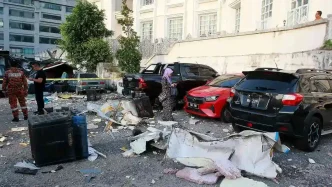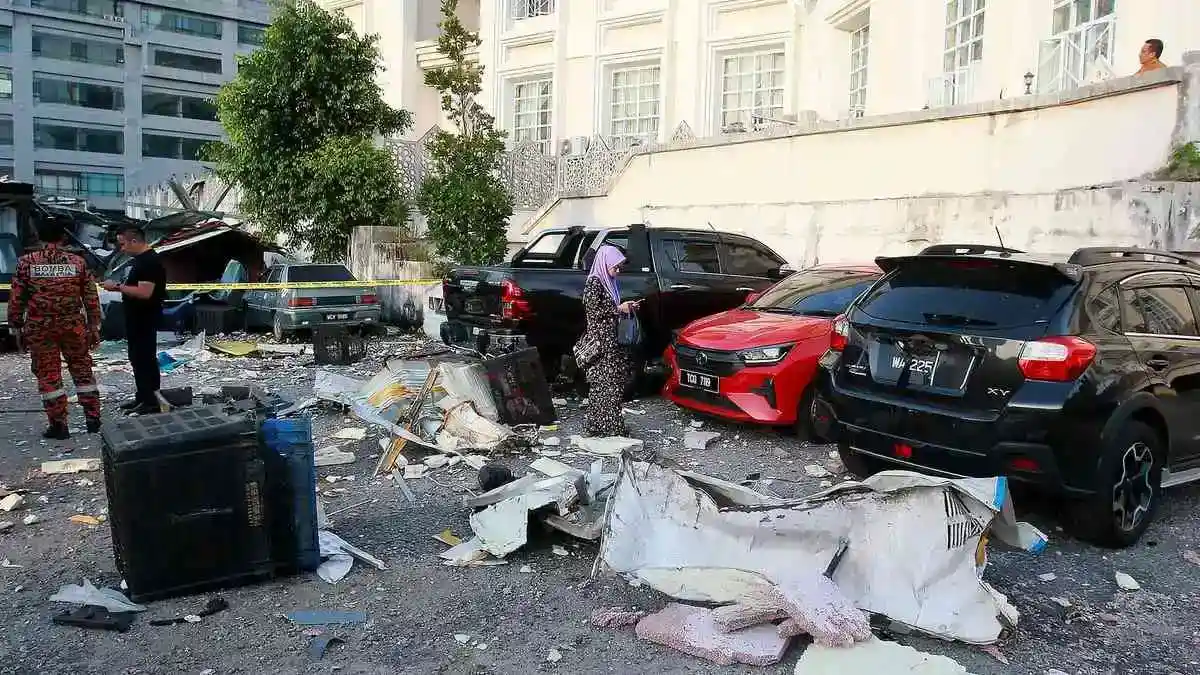A powerful explosion rocked a fruit shop in Bandar Baru Klang, a bustling suburb of Kuala Lumpur, on the evening of June 12, 2025, causing part of the shop’s wall to collapse and damaging six vehicles parked nearby. While no injuries were reported, the incident has sparked concerns about the use of hazardous chemicals in everyday businesses and the potential risks to public safety in densely populated areas.
Details of the Incident
The blast occurred around 5:27 p.m. on Thursday, prompting a swift response from the Selangor Fire and Rescue Department. Ahmad Mukhlis Mukhtar, assistant director of the department, confirmed that firemen from the North Klang Fire Station arrived at the scene within six minutes of receiving the distress call. “Part of the wall structure of the shop collapsed, and six vehicles parked nearby were also affected” he stated, reassuring the public that no one was harmed in the incident.
Initial investigations by authorities point to calcium carbide as the likely cause of the explosion. This chemical, often used to accelerate the ripening of fruits, can be highly volatile if mishandled. “The chemical is used to hasten the ripening process” Mukhtar explained, highlighting a common but potentially dangerous practice in the fruit trade. The exact circumstances leading to the explosion remain under investigation, but the incident has already drawn attention to the need for stricter regulations and safety protocols surrounding the use of such substances.
Community Impact and Response
Bandar Baru Klang, a commercial and residential hub near Malaysia’s capital, is no stranger to the hustle and bustle of small businesses like fruit shops. However, Thursday’s explosion has left local residents and shop owners shaken. The damaged vehicles, belonging to customers and passersby, underscore the potential for broader harm had the incident occurred at a busier time of day. The collapsed wall of the shop, meanwhile, serves as a stark reminder of the structural vulnerabilities that can exacerbate such accidents.
Local authorities have cordoned off the area to ensure safety while investigations continue. The Selangor Fire and Rescue Department has urged businesses to exercise caution when handling chemicals like calcium carbide, emphasizing the importance of proper storage and usage guidelines. Community leaders in Bandar Baru Klang have also called for increased oversight of small businesses to prevent similar incidents in the future, with some residents expressing frustration over what they perceive as lax enforcement of safety standards.
Safety Concerns Over Chemical Use
The use of calcium carbide in fruit ripening is a widespread practice across Southeast Asia, often employed to meet consumer demand for ripe produce year-round. When mixed with water, the chemical releases acetylene gas, which mimics the natural ethylene gas produced by fruits to speed up ripening. However, if not handled correctly, calcium carbide can pose significant risks, including the potential for explosions or the release of toxic residues that may contaminate food.
While the practice is not illegal in Malaysia, there are growing calls for tighter regulations and public awareness campaigns to educate vendors on safe handling. Health and safety advocates argue that alternatives, such as ethylene-based ripening agents or natural ripening methods, should be promoted to reduce reliance on hazardous chemicals. The Bandar Baru Klang explosion may serve as a wake-up call for authorities to revisit existing guidelines and ensure that small businesses are equipped with the knowledge and resources to operate safely.
Broader Implications for Urban Safety
This incident also raises broader questions about urban safety in rapidly developing areas like Bandar Baru Klang. As Malaysia continues to urbanize, commercial zones are increasingly intertwined with residential neighborhoods, amplifying the risks associated with industrial or chemical mishaps. The fact that six vehicles were damaged in the explosion highlights how even a localized incident can have a ripple effect on the surrounding community.
Urban planners and safety officials may need to consider zoning regulations that separate potentially hazardous businesses from high-traffic areas. Additionally, regular safety audits and training programs for small business owners could help mitigate risks. While the immediate focus remains on the investigation into Thursday’s explosion, the incident could prompt a larger conversation about balancing economic activity with public safety in Malaysia’s growing urban centers.
As the community of Bandar Baru Klang begins to recover from the shock of the explosion, many are left wondering how such incidents can be prevented in the future. The damaged fruit shop stands as a cautionary tale, urging both authorities and businesses to prioritize safety over convenience in an ever-changing urban landscape.
















